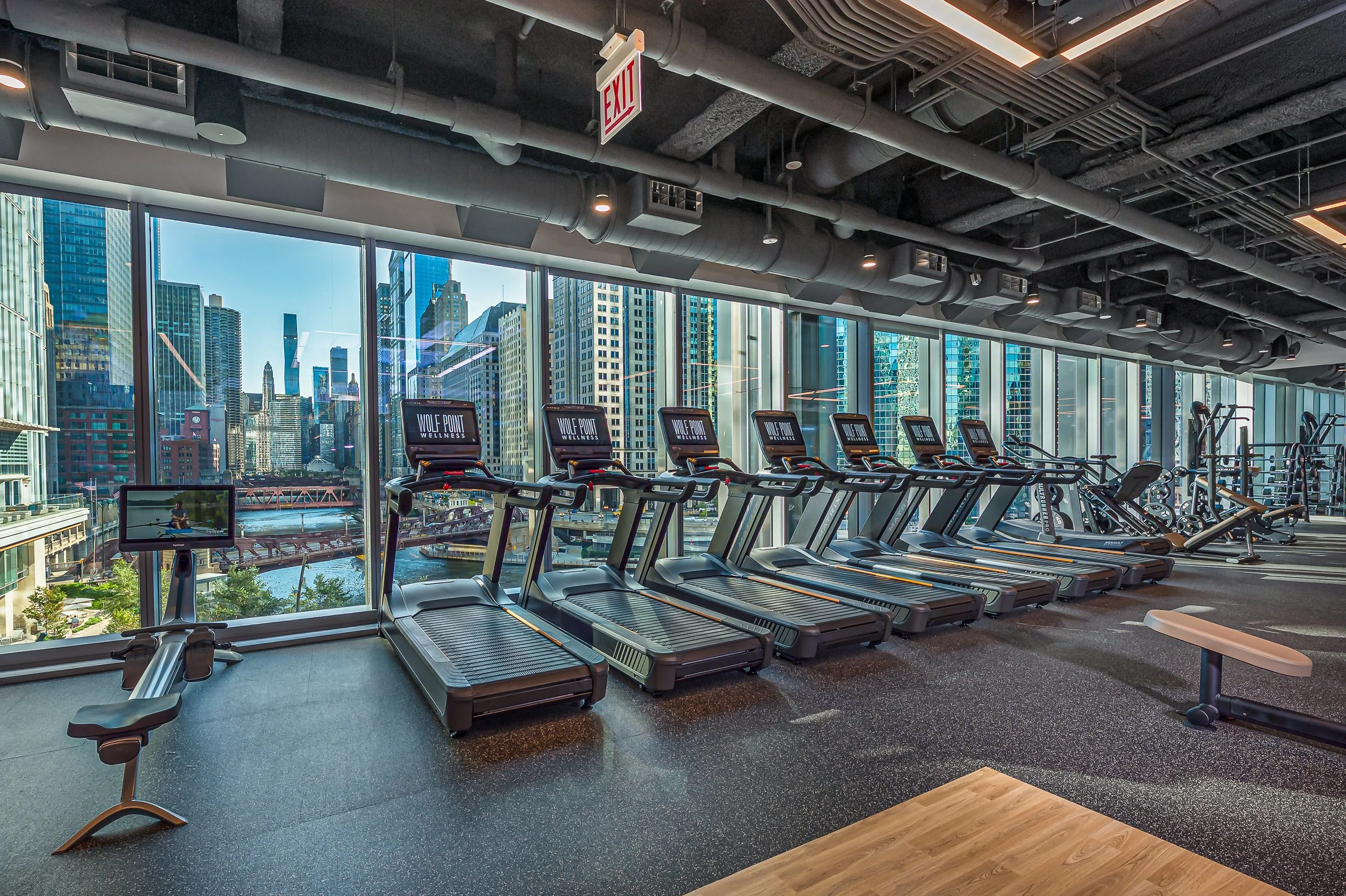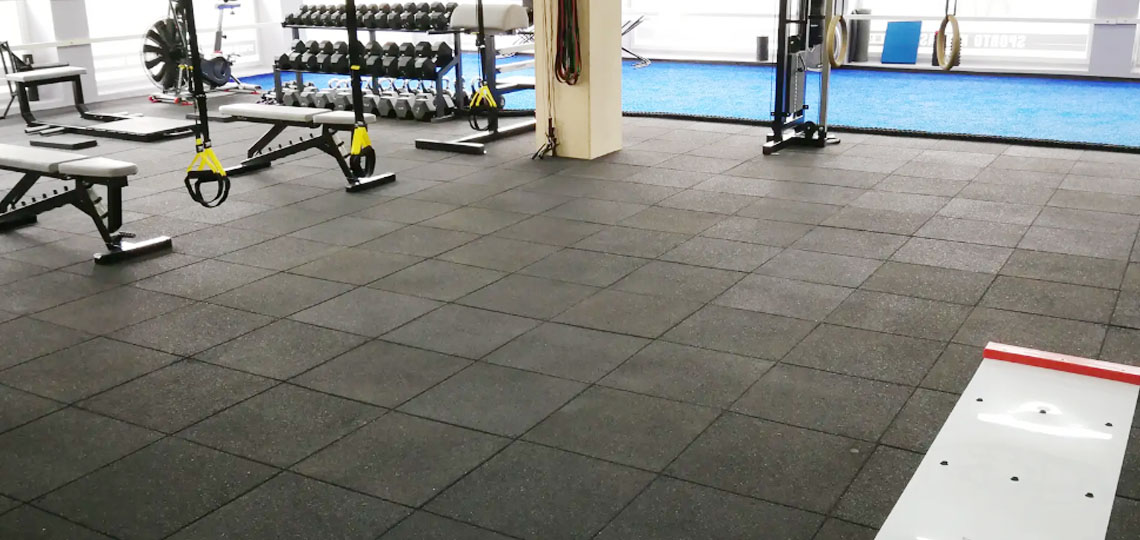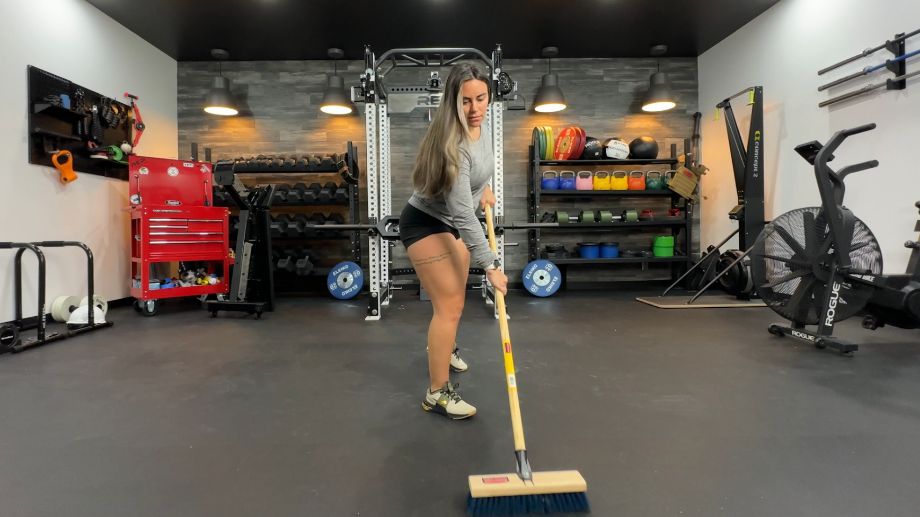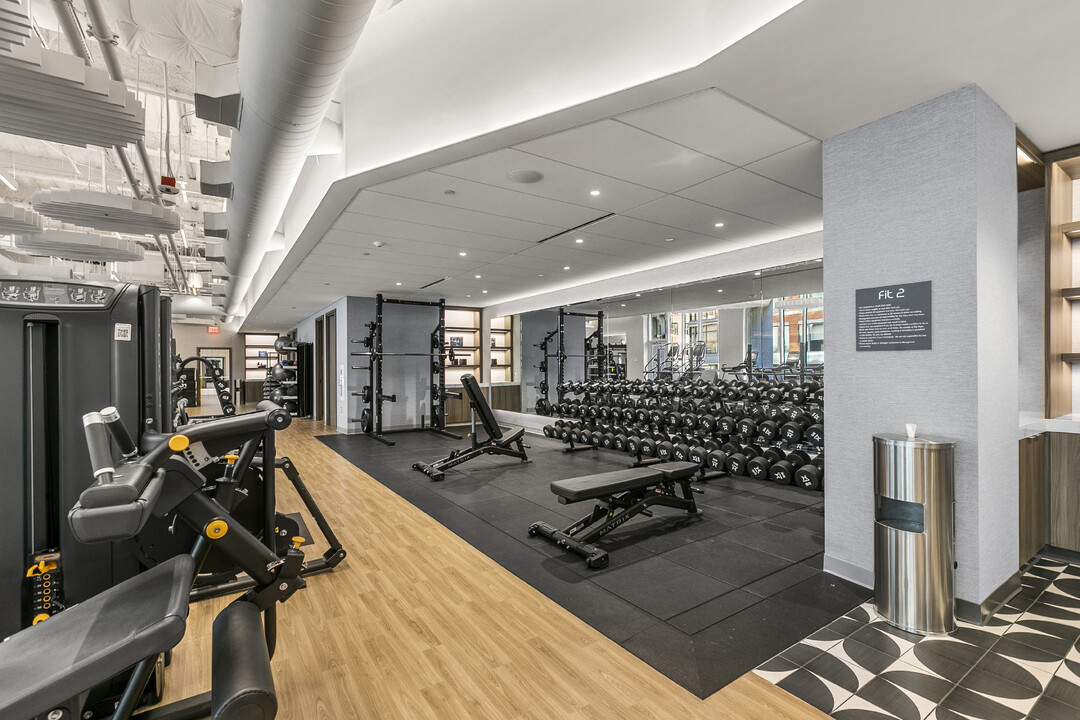Hey there, fellow fitness enthusiast. Picture this: It’s 6 a.m., the city’s just waking up, and you’re lacing up for that killer deadlift session in your home setup. Or maybe you’re the gym owner in Delhi’s buzzing heart, watching clients crush their goals without a worry about slips or scuffs. Either way, the floor beneath you? It’s not just a surface—it’s your silent workout partner, absorbing shocks, gripping your stance, and keeping things safe. I’ve been knee-deep in the fitness world for over a decade now, from turning my garage into a sweat sanctuary to advising buddies on outfitting their studios. And let me tell you, nothing tanks motivation faster than cheap flooring that buckles under a barbell or turns your space into a slip ‘n slide. That’s why today, we’re diving into the world of gym flooring manufacturers and exporters right here in Delhi, India—where quality meets affordability, and your fitness dreams get a solid foundation.
What Exactly Makes Gym Flooring a Game-Changer?
Gym flooring isn’t your grandma’s linoleum—it’s engineered toughness wrapped in smart design. Think shock absorption that cushions joints during burpees, anti-slip textures for those sweaty CrossFit WODs, and durability that laughs off dropped kettlebells. In a city like Delhi, where gyms range from high-end chains to cozy home nooks, the right floor protects your subfloor from cracks, muffles noise for apartment dwellers, and even boosts hygiene with easy-clean materials. I’ve seen too many folks regret skimping here; one wrong drop, and you’re nursing a twisted ankle or a repair bill. Done right, though, it elevates your space, making every rep feel supported.
From rubber rolls that seamless-roll out for commercial beasts to interlocking tiles perfect for DIY home tweaks, these materials turn chaos into a pro setup. And with India’s booming fitness scene—gyms popping up like chai stalls—the demand for export-grade options is skyrocketing. Whether you’re eyeing local installs or shipping to Dubai, Delhi’s manufacturers are nailing it.
The Rise of Delhi as India’s Gym Flooring Powerhouse
Delhi’s got that gritty edge—think roaring traffic and endless energy—and it’s spilling into manufacturing. Over the last decade, the National Capital Region has become a hub for rubber processing, thanks to raw material access and skilled labor. Exporters here aren’t just slinging mats; they’re crafting export-quality gems that meet global standards like ISO certifications, shipped to the Middle East, Europe, and beyond. Remember when I helped my cousin set up his Mumbai gym? We sourced from a Delhi exporter, and those tiles held up through monsoon humidity like champs. It’s no wonder—local firms blend traditional craftsmanship with modern tech, keeping prices 20-30% lower than imports while matching durability.
This boom ties into India’s fitness surge; post-pandemic, gym memberships jumped 40%, per industry reports. Delhi suppliers are riding that wave, offering everything from EPDM granules for color pops to recycled rubber for eco-warriors. If you’re building or revamping, starting here means faster delivery, custom tweaks, and that hometown reliability.
Top Types of Gym Flooring Materials: Which One Fits Your Sweat Sessions?
Choosing gym flooring feels like picking a running shoe—too thin, and you’re sore; too bulky, and it’s overkill. But break it down, and it’s straightforward. Rubber dominates for its bounce-back vibe, while foam suits lighter vibes. I’ve tested rolls in my setup and tiles for a client’s studio—each shines in its lane. Here’s a quick rundown to match your needs, whether home cardio or commercial powerlifting.
Rubber Rolls: The Seamless Heavyweight Champ
Rubber rolls unspool like a red carpet for your weights, creating a continuous surface that eats impacts without seams to trip over. Ideal for big commercial floors, they’re 8-12mm thick, with black bases flecked in colors for that pro look. I once rolled these out in a 500 sq ft space—took half a day, zero hassle.
Pros: Supreme shock absorption, noise dampening, and slip resistance; lasts 10+ years under heavy use.
Cons: Heavier to install solo; might need adhesive for permanence.
Interlocking Rubber Tiles: DIY Dream for Home Gyms
These puzzle-piece wonders click together sans tools, perfect for garages or apartments. At 10-20mm thick, they hide dirt with flecks and flex just right for yoga-to-deadlifts transitions. My home gym’s tiled floor? Still mint after five years of family HIIT.
Pros: Easy swap-outs for damage; portable and budget-friendly at ₹200-400/sq ft.
Cons: Seams can collect dust if not sealed; less ideal for ultra-heavy sled pushes.
Foam Mats and EVA Tiles: Cushy for Cardio and Kids
Lightweight and bouncy, foam’s your pick for bodyweight zones or play areas. EVA variants add grip without bulk, great for home setups where space is tight.
Pros: Super affordable (₹100-250/sq ft) and joint-friendly for low-impact fun.
Cons: Compresses under weights; not for barbells—save it for mats under ellipticals.
Vinyl and Turf: Versatile Vibes for Multi-Use Spaces
Vinyl mimics wood with waterproof ease, while turf adds that outdoor sprint feel indoors. Both shine in hybrid gyms blending cardio and functional training.
Pros: Aesthetic flexibility and easy wipe-downs; turf drains sweat like a champ.
Cons: Vinyl scratches easier; turf needs occasional brushing to fluff up.
Pros and Cons: A Side-by-Side Showdown for Smart Buying
To make it crystal, let’s table this out. I’ve pulled from real installs—think Delhi humidity tests and export shipments—to show what holds up where.
| Material | Best For | Pros | Cons | Price Range (₹/sq ft) | Lifespan (Years) |
|---|---|---|---|---|---|
| Rubber Rolls | Commercial weights | Seamless, max durability, soundproof | Install effort, initial weight | 250-500 | 10-15 |
| Rubber Tiles | Home/DIY setups | Quick install, customizable colors | Potential seam gaps | 200-400 | 8-12 |
| Foam/EVA | Cardio/yoga zones | Soft cushion, lightweight portability | Wears under heavy loads | 100-250 | 5-8 |
| Vinyl | Multi-purpose studios | Stylish, waterproof, low-maintenance | Less shock absorb for drops | 150-300 | 7-10 |
| Turf | Functional training | Grip for sprints, easy clean | Higher upkeep, not for weights | 300-600 | 6-10 |
This chart’s your cheat sheet—rubber rolls win for pros, tiles for starters. Factor in your square footage; a 200 sq ft home gym might run ₹40,000-80,000 total.
Spotlight on Delhi’s Standout Manufacturers and Exporters
Delhi’s scene is stacked with players who’ve turned raw rubber into global gold. I’ve chatted with owners at trade fairs—folks like Fab’s team, grinding since ’90 for that export polish. Here’s my curated shortlist, based on quality, reach, and those “aha” client stories.
Fab Floorings India: The Export Trailblazer
Since 1990, Fab’s been Delhi’s rubber royalty, churning out rolls and tiles in vibrant hues. Their 30+ years mean ISO nods and shipments to 20+ countries—think laminated tiles that flex without cracking.
One gym owner I know swapped generics for Fab’s 12mm rolls; no more vibrations rattling his upstairs neighbors. They handle custom EPDM flecks too, blending safety with style.
Gym Mate: Homegrown Heroes for Custom Creations
Tucked in Bawana Industrial Area, Gym Mate’s all about that personal touch—thicknesses from 6mm to 50mm, colors galore. Exporters to the Gulf, they’ve got a rep for non-toxic, eco-rubber that passes EU tests.
I recall a funny mishap: A client ordered “vibrant” tiles, got neon—turns out, it pumped up his Zumba classes! Quick fixes and installs make them a fave for Delhi’s startup gyms.
Amazing Floors: Innovation Meets Affordability
These guys pioneer EPDM and interlocking wonders, exporting to Europe with recycled creds. Their premium tiles? Shock-absorbers extraordinaire, hiding sweat stains like pros.
A pal’s home gym got their EVA mats—kids love the bounce, and cleanup’s a breeze post-playdate workouts. Nationwide delivery keeps ’em accessible.
Gymtex Flooring: Legacy with a Modern Twist
30 years strong, Gymtex blends export-grade mats with Delhi hustle. Their non-toxic rolls serve 15 states, from pro arenas to home havens.
Ever laugh at a “rubber smell” horror story? Gymtex’s are odor-free—my export buddy swears by ’em for international crates.
Ashmita Enterprises: Budget Bosses with Bulk Power
Rohini-based, they’re wholesalers extraordinaire, importing vinyl alongside local rubber. Exporters to Noida-Gurgaon circuits, their mats scream value.
One exporter tale: Shipped 1,000 sq m to Dubai—arrived flawless, zero customs drama. Perfect for scaling your setup without breaking bank.
For more on these, check TradeIndia’s gym flooring listings or IndiaMart’s Delhi suppliers.
How to Pick the Perfect Gym Flooring for Your Space: Home vs. Commercial
Deciding feels overwhelming, but start with intent: Home gyms crave portability; commercial needs beast-mode endurance. Measure your area—add 10% buffer for edges. Budget? Factor install (₹50-100/sq ft extra). For home, tiles win ease; commercial, rolls for seamlessness. Test samples—feel the grip, sniff for off-gassing. In Delhi’s heat, prioritize moisture resistance to dodge mold.
I once advised a newbie gym owner: Skipped thickness calcs, ended up with foam under racks—total flop. Lesson? Match material to moves. Consult locals like Fab for free audits; they’ll eyeball your subfloor and suggest underlay for extra oomph.
Installation Insider Tips: From Unbox to Unbreakable
Nobody wants a wonky floor mid-squat. For rolls, sweep subfloor, unroll in sections, tape or glue down—pro tip: Acclimate 48 hours in Delhi’s AC to avoid warps. Tiles? Puzzle ’em out, starting center; mallet taps seal edges. Turf needs infill sand for stability. Hire certified crews from suppliers—Gym Mate’s team nailed my cousin’s 300 sq ft in four hours, no mess.
Humor alert: First time I DIY’d, tiles fought back like stubborn Tetris. Borrow a knee pad; your joints thank you.
Keeping It Fresh: Maintenance That Lasts Longer Than Your Resolutions
Your floor’s low-drama: Sweep daily, mop weekly with mild soap—no bleach, it eats rubber. For rolls, lift edges quarterly to vacuum underneath. Tiles? Spot-clean spills pronto. In humid Delhi, fans help dry sweat; antimicrobial options from Amazing Floors cut odor battles.
True story: Ignored a gum blob once—turned into a sticky nightmare. Weekly rituals keep it gym-fresh, extending life by years.
People Also Ask: Real Questions from Fitness Folks Like You
Drawing from Google’s hot queries, here’s the scoop on what Delhi gym-goers are buzzing about.
What is the best gym flooring for a home setup in Delhi?
Rubber tiles top the list for easy install and joint protection—think 10mm thick from Gym Mate. They’re affordable at ₹250/sq ft and handle Delhi’s dust without fuss.
Where can I buy gym flooring in Delhi for export quality?
Hit Fab Floorings or Gymtex in Bawana—they ship globally with ISO stamps. Prices start at ₹300/sq ft for premium rolls.
How much does gym rubber flooring cost in India?
Expect ₹200-600/sq ft, depending on type—rolls cheaper for bulk. Delhi suppliers like Ashmita bundle installs to save 10-15%.
What thickness of gym flooring do I need for weights?
12-20mm for deadlifts; thinner 8mm for cardio. Amazing Floors’ guides nail this—thicker means quieter drops.
Is rubber flooring eco-friendly for gyms?
Absolutely—recycled options from Gymtex cut waste, with non-toxic binders. Great for green certifications in export markets.
FAQ: Tackling Your Top Gym Flooring Queries
Q: Can I install gym flooring myself in a Delhi apartment?
A: Yep, interlocking tiles are beginner-proof—clear the space, level the floor, and click away. For rolls, grab a buddy; glue-down needs ventilation in our dusty air.
Q: What’s the warranty on Delhi-made gym mats?
A: Most like Fab offer 5-10 years against defects. Register post-install for extras—I’ve seen claims honored lightning-fast.
Q: How do I choose colors for my gym floor?
A: Black fleck hides grime; pops of red/blue energize. Match your vibe—Gym Mate’s samples help visualize without commitment.
Q: Are there hypoallergenic options for sensitive skin?
A: Low-VOC rubber from exporters like Amazing Floors fits the bill—no off-gassing, perfect for family gyms.
Q: What’s the lead time for custom export orders from Delhi?
A: 2-4 weeks for production, plus shipping. Fab’s streamlined ops cut it to 10 days for standards—track via their portal.
There you have it—your blueprint to bombproof gym flooring from Delhi’s finest. Whether scaling a startup studio or fortifying your home haven, these manufacturers deliver the goods that turn “good enough” into “game on.” I’ve sweated on enough setups to know: Invest here, and your floor fuels the fire, not fights it. Ready to roll? Drop a line to one of these pros, grab samples, and let’s build that unbreakable base. What’s your next move—home tweak or full export empire? Hit the comments; I’m all ears.




